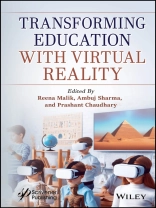TRANSFORMING EDUCATION WITH VIRTUAL REALITY
The book provides an in-depth and comprehensive knowledge reviewof the use of virtual reality in the education industry and businesses.
Virtual reality (VR) technology has thoroughly transformed education by providing engaging and immersive ways for students to experience their education and by offering visual learning, creative development, etc., to enhance their studies. Moreover, with increasing accessibility, both students and educators can utilize it for effective teaching and learning. By embracing this VR-related technology, teachers can transform traditional classrooms into lively ones. Businesses can also leverage VR for skilling, up-skilling, and re-skilling.
This book is divided into two parts. Part I discusses the opportunities, challenges, and application of VR technology, and Part II focuses on reimagining education with the metaverse.
Readers will find in this book:
* a description of the relationship between virtual reality and student behavior;
* a review of VR-enabled tools and techniques for an immersive environment;
* a discussion on VR in the context of vocational education by developing a conceptual framework and roadmap for its adoption;
* an overview of the advantages, disadvantages, and mechanisms of VR through a detailed analysis showing a comparison of the strong and weak points of the technologies being used in education;
* a look at the future of learning in the context of VR;
* a description of the relevance of VR in emerging economies with the help of bibliometric analysis and discusses its future potential;
* a review of Metaverse as a new education avatar showcasing diverse educational experiences and how to reimagine teaching;
* an explanation of the relevance of emerging digital technologies in upskilling employees in fashion retail to impart an immersive experience for customers;
* a proposed framework for mapping the use of VR for students with autistic spectrum disorder (ASD).
Audience
The book is designed for information technologists, educational researchers, teachers, policymakers, government officials, and business managers.
Über den Autor
Reena Malik is an assistant professor at the Chitkara Business School at Shitkara University in Punjab, India. She has a Ph D in marketing management and a degree in commerce and management. She has published three books, various research papers, and book chapters. She has been teaching for the last ten years and actively works in research areas like consumer behavior, brand management, and customer satisfaction.
Ambus Sharma is an assistant professor at Ballabh Pant Social Science Institute, Allahabad, India. He received his Ph D in management and business administration sciences from Szent Istvan University, Hungary. His research areas include diversity management, human resources practices, and disability studies. He has published multiple research articles in international journals.
Prashant Chaudhary is an associate professor with Dr. Vishwanath Karad at the MIT World Peace University, Pune as well as an associate professor at the School of Management. He has authored two books and won various awards including the Innovative Educator Award.












